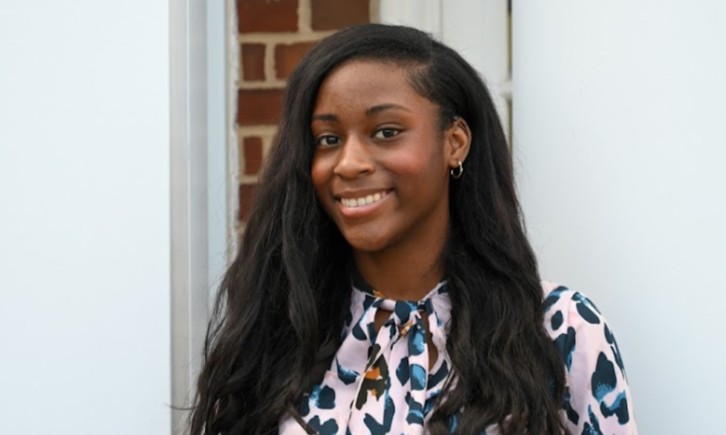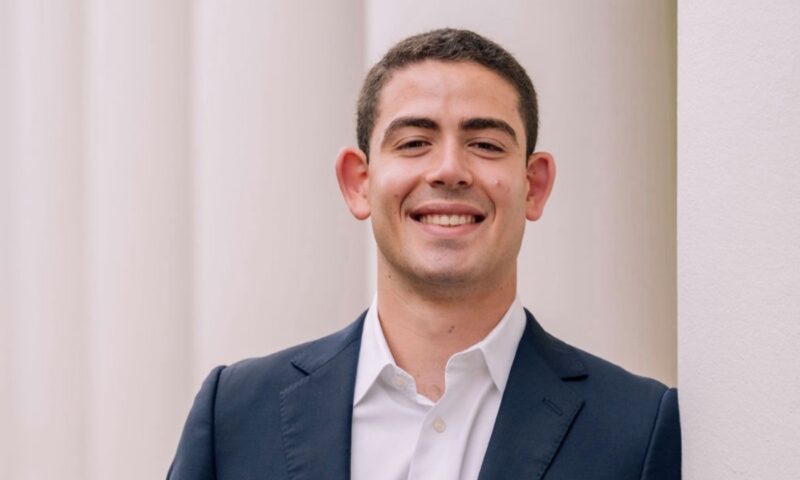The University of Virginia’s student-run Honor Committee was established to maintain and support UVA’s “community of trust” through its Honor System. The Committee representatives, who are elected from every school across Grounds, do a great many things that deal with multiple aspects of the system beyond Honor offenses—acts of lying, cheating, or stealing—and they want students to know they’re driven to support students, not punish them.
Among the Committee’s dedicated members are Commerce School representatives Carson Breus and Simran Havaldar, who both bring unique perspectives and a deep commitment to their roles. They’re motivated to share with their fellow students the positive aspects of their work with the Committee that goes far beyond processing academic misconduct cases: The organization exists to foster a culture of integrity and serves as a vital resource for the entire UVA community.
Breus, a fourth-year student from Los Angeles, CA, majoring in Commerce and East Asian Studies, and Havaldar, a fourth-year student from Northern Virginia concentrating in Accounting and Finance, have both taken on significant Honor Committee roles.
Structure and Purpose
The UVA Honor Committee, designed to maintain the University’s high moral values, is divided into several subcommittees and roles, including Advisers, Investigators/Counsel, and Educators. Each plays a crucial part in the functioning of the Honor System.
Advisers help students receive impartial information and relax when they are involved in Honor proceedings, ensuring that those under investigation have a reliable resource during what can be a stressful process; they sometimes provide emotional support as well. Investigators are responsible for thoroughly and impartially investigating allegations of Honor offenses, doing what they can to pursue the truth. Counsel fairly present the views of anyone accused as well as the community view and assist both sides in preparing their cases. Educators engage in outreach to inform the broader UVA community about the ideals of the Honor System, its policies, and its process.
“There are two levels of Honor,” explains Breus. “There are Committee members, which Simran and I are, and then there are support officers (SOs), which we both were. SOs help guide the Honor process, and senior SOs are the go-to officers for complex cases in addition to training the new class of SOs. And then we have Committee members, who serve as panelists for every Honor hearing. You have to be elected or appointed to be a Committee member. Within that, we have the Executive Committee that guides the overall direction of Honor, which I’ve been on since my second year.”
“In addition to all of those different groups, we also have various subcommittees that SOs and Committee members can join and chair,” says Havaldar. “For example, we have our Selections and Recruitment Committee. We have the Faculty Advisory Committee, which I’m a part of, which looks at faculty’s interactions with the Honor System. We have the Policies and Procedures Committee, which looks at the bylaws and any improvements that can be made, as well as Community Relations and Diversity Committee, which looks at Honor’s interactions with the community, student leaders, and various CIOs on Grounds.”
“There’s so much going on in Honor right now,” says Breus.
Carson Breus: Drawn to Honor
Breus’s introduction to the Honor System came during her first year at UVA. The concept of a student-run Honor System intrigued her, leading her to become an Investigator/Counsel.
“Honor has really shaped my time at UVA—with other extracurriculars as well,” she says. “I was always drawn to being on UVA’s Honor Committee, and I knew that it was something I’d be really passionate about.”
“I applied, went through the interview process, and initially served as an Investigator/Counsel,” Breus says. “It was a role that aligned with my interest in law and allowed me to engage directly with the case process.”
She would become a Senior Investigator/Counsel, training new SOs and serving as the go-to Counsel for cases. “I staffed around six cases as Counsel, five as an Investigator. When we passed our new multi-sanction system, which I thought was an incredible opportunity for Honor to reflect the current needs of the student body, we had this big knowledge gap about how we could sanction cases and what that panel would even look like. I wanted to face that challenge head-on, so I ran to become McIntire’s Committee representative. I was accepted into McIntire the day before the election, which was very convenient,” she explains, adding that she also became Vice Chair for Sanctions.
“The best part about the role was that it was undefined and that I could help mold it for future generations of Honor,” she says, noting that in addition to chairing all the panels for sanctions and training new support officers, Breus helped craft the bylaws and became a key figure in implementing the multi-sanction system. This system introduced more nuanced responses to Honor offenses, focusing on rehabilitation and restoration rather than solely punitive measures.
As Vice Chair for Sanctions, Carson has chaired over 60 sanctioning panels, significantly reducing the time from report to sanction and ensuring a more restorative process.
Simran Havaldar: Support and Education Advocate
Discovering that UVA had an Honor System entirely run by students inspired Havaldar. “I really wanted to be a part of it because that work is so meaningful and drew me towards the Adviser role,” she says. “The whole idea that I could get involved by helping a student going through this extremely stressful, draining process was unique to me.”
She served as an Adviser for her first and second years and became a Senior Adviser, training the incoming class of new Honor Advisers. “It was a great experience because it helped me reevaluate the system as I was teaching new trainees.” That process motivated her to run for McIntire’s representative position. “I wanted to explore Honor in a different way than I had in the past—not just being a part of case processing, but also part of the whole bylaws, constitution, and looking at the big picture of Honor.”
Having co-chaired the Honor Committee’s selections and recruitment efforts this past year and serving on the Faculty Advisory Committee last year, she’ll be chairing the latter.
“I’ve really appreciated getting involved with Honor and exploring case processing, outreach, and getting high-quality, passionate support officers to join Honor, examine faculty feedback, and all of these different ways that Honor interacts with the community,” says Havaldar.
The Honor System at McIntire as a Resource
Both Breus and Havaldar emphasize that the Honor Committee is not just a disciplinary body, but also a resource and ally for students at McIntire and across UVA. They encourage students to engage with the Honor System proactively and see it as a supportive institution rather than a punitive one.
Havaldar expresses that one of her main motivating factors has been making the Honor System clearer and more accessible to students. She wants McIntire students to feel comfortable approaching their representatives “if they have questions about their specific course, the Honor policy, questions about the way Honor works, or are just curious about the system.”
She says that while many students don’t interact with Honor unless they are reported, the Committee aims to change that.
“We want Honor to interact with students in other ways, enhancing outreach so that students can see that Honor isn’t necessarily a daunting institutional structure. It can be more accessible. We’re here to promote academic integrity, not punish students, and we can do that in a variety of different ways,” says Havaldar. The intent is to foster the relationship between faculty and students “so that everyone is working toward the same common goal of academic integrity.”
Breus agrees completely. “Our main role for Commerce students is to not only inform them about the case process, but also to help promote Honor throughout McIntire. In addition, students and professors should know that we can’t give case-specific advice because we’re on the Committee,” she clarifies. “When we were SOs, we were allowed to guide people, but we can’t necessarily do that now. Yet we can hear your case and connect you to the best people to help.”
Innovations and Outreach
Breus and Havaldar are proud of their contributions to the Honor Committee and committed to furthering its mission. Both plan to continue refining the sanctioning process and exploring innovative ways to integrate Honor into the broader UVA and McIntire experience, enhancing outreach efforts and ensuring the Honor System remains a supportive presence on Grounds.
“When we transitioned to this multi-sanction system, the goal was to have it be more rehabilitative, restorative, and equitable for all students involved. I’ve been active in trying to make that vision a reality,” Breus says. “The Honor case process before [it became] multi-sanction was extremely inefficient: It took anywhere from six months to two years to process a case. I’ve done a lot of work on the case processing side to make it more efficient. If a student admits guilt, the report to sanction time is now less than two months,” she says. “In addition, students that go through the process are appreciative of how Honor prioritizes their personal growth and that their sanctions are not merely punitive. It’s now a lot more educational.”
Outside of the newly streamlined sanction process, Breus and Brianna Kamdoum (McIntire ’24), a former Commerce representative, created the first-ever McIntire Honor Case Competition last spring. Breus and Havaldar are planning another in the coming months and are interested in being involved in many positive facets of McIntire’s student life.
“I’d love for McIntire students to know that we have a large budget exclusively dedicated to co-sponsoring student organizations and events,” adds Breus. “We love to share that with people because every club at McIntire could use more funding. It’s very easy to apply to on our website, but not a lot of people seem to know about it.”
Their dedication and hard work underscore the importance of student self-governance and the impact it can have on maintaining and promoting the University’s long-held values of integrity and respect. For McIntire students, Breus and Havaldar’s dedication and vision serve as a reminder that the Honor Committee is a resource designed to support and guide them throughout their academic journey, fostering and strengthening the community of trust and academic honesty.



